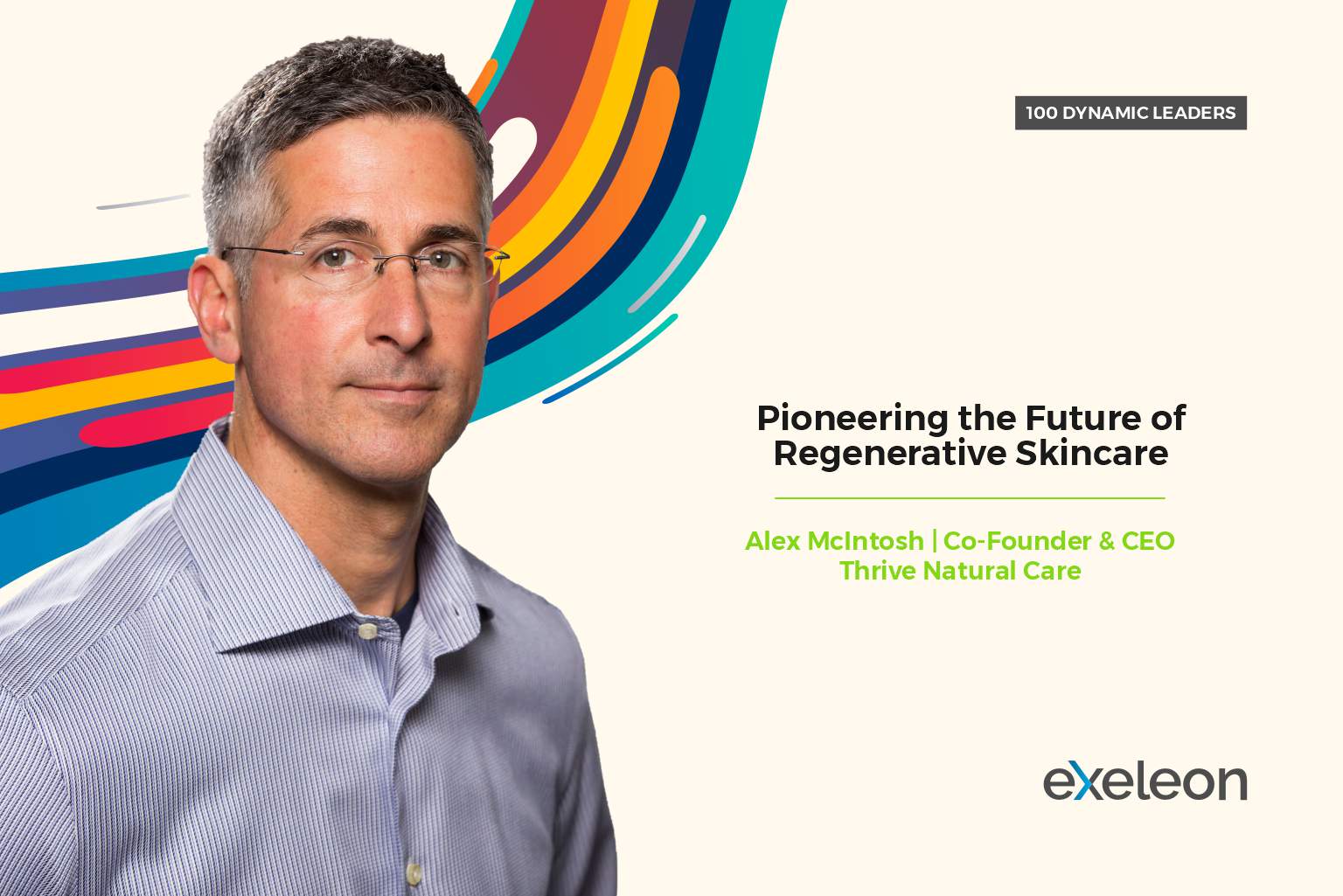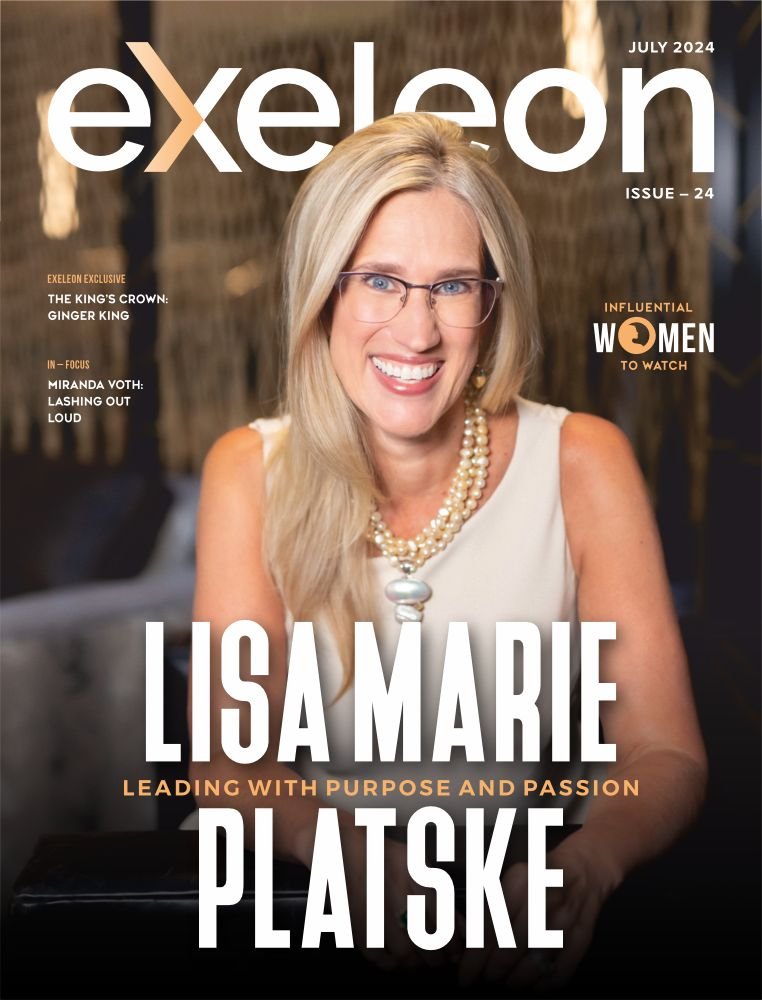
This feature is part of our 100 Most Dynamic Leaders of 2023. Check out the entire issue and listing by clicking on this link.
As the Founder and CEO of Thrive Natural Care, Alex McIntosh is spearheading a movement towards a regenerative future.
Since its inception in 2012, Thrive hasn’t just been about creating effective skincare products; it’s about a larger ethos that intertwines skincare, sustainability, and social impact.
The power of Thrive’s offerings lies not only in their tangible benefits to the skin but also in their broader impact on the planet and its inhabitants. The regenerative farming methodology, a cornerstone of Thrive’s operations, does more than ensure the purity and potency of ingredients. It symbolizes a commitment—a commitment to rejuvenating the earth, bolstering rural farming communities, and redefining the benchmarks for business.
In your experience, what are some of the essential qualities a successful CEO should possess?
The skillset needed by a CEO at a large/established company obviously differs from the skillset needed by a CEO at a start-up/early-stage company. But the qualities of a transformational CEO are, in my experience, consistent across sectors and companies. The essential qualities are: a big vision, an ability to communicate that vision compellingly to various stakeholders, a good sense of strategy, drive, and, above all, the ability to find/recruit/retain great talent.
Talk to us about Thrive Natural Care and its regenerative business model.
I believe the future of skincare—and business—is regenerative. Since Thrive’s founding in 2012, we have intentionally designed our products and operations for regenerative impact. And the regenerative farming methodology makes our super plant ingredients more potent and purer than conventionally produced ingredients. Which means better skin results. Today, Thrive Natural Care regenerates your skin, our planet, and rural farmer communities.
Our cross-cultural team of ecologists, ethnobotanists, rural farmers, and entrepreneurs selects native plants for cosmetic and ecosystem attributes. We re-introduce the “super-plants” to degraded lands owned by rural farmers. Soil health, biodiversity, and farmer livelihoods are improved year on year via agro-ecological cultivation and raw material transformation. We design our skincare products and power them with these unique-to-Thrive super-plants.
Customers prefer Thrive products because our regeneratively-sourced ingredients are more effective than conventional equivalents (“look better”), our formulas meet higher standards for safe & clean (“live healthier”), and customers’ purchases make a positive impact (“leave it better).
What are some of the key challenges you have faced while building and growing Thrive Natural Care? How have you addressed those challenges?
On the product side, it was certainly a challenge to commercialize three new to market superplant ingredients in a foreign country (Costa Rica), design a full line of sun-care and skincare products that would outperform conventional products.
On the commercial side, we are in an incredibly competitive vertical, so competition alone is a daily challenge. Skincare is a $146 billion dollar industry. Additionally, we are facing the same challenges in the broader CPG category with acquisition costs increasing rapidly and winning on traditional channels being more difficult. Fortunately, we’ve established a very strong business on Amazon, where Thrive is in the top 1% of global sellers. But to combat these acquisition challenges I noted before, we invested in creative new team members that had aligned values with our brand. We have explored and tested unique channels, some with great success. This year is truly all about learning and growth for our business on top of our Amazon foundation, and it is exciting.
More and more brands are introducing sustainable and natural products in the market. What would you attribute this recent shift to?
- Consumer demand; (2) Smarter brand management (3) Ecological imperative.
First, consumers are less willing to settle today. They want “healthier for me AND works better for me.” Natural products, the best ones, can now outcompete conventional products. Take Thrive for example: our regeneratively-grown superplants—unique to our skincare products—actually are more potent and more pure than conventionally produced skincare ingredients. This means healthier, better-looking skin. Relatedly, consumers are more aware of the impact THEY have on the environment, so there is a demand for sustainable products in the market. Consumers want the upside without the guilt.
Second, smarter brand management. I believe brands, particularly new brands, are more frequently led by founders that recognize the need more sustainable production of goods. Not as a do good. But just like financial management or good marketing, more sustainable is just another metric for a well-run, well led business. Today’s best leaders are aware of the impact we have on the planet and actively try to produce a positive impact rather than a harmful one. Because its good business and because it engenders greater brand loyalty.
Third, ecological imperative. We felt it was important to aim business higher. Beyond do no harm mentality of sustainability, and instead a leave it better mentality. There’s already a tremendous amount of ecological capital we’ve spent down as a human species: fisheries, soil, biodiversity, clean air/soil, water. So just “leaving things better” isn’t the solution for our kids or grandkids. Doesn’t matter if you’re a tree hugger or conservatively religious. We have an obligation to steward for the generations that come after us.
This is one of Thrive’s core values and something that is baked into everything we do. From our products being grown with plants that actually leave the soil and earth better to our partnerships with farmers that are now able to grow and sell their crops and improve their overall economic well-being, to our customers having access to healthier, more effective skincare products–we want to generate a “leave it better” impact across the whole chain.
What would be your advice for someone entering the skincare products market?
Have a clear point of differentiation in the market. Have a smart plan to let people know you exist. Create real value for your customers. Become incredibly nimble and be prepared to pivot effectively. I have always believed that if you have the best products and a unique story, you can win in nearly every market. Those components are what will drive your growth. If you have clever marketing, you might be able to squeeze out some early success, but you will most likely fizzle out quickly.
I think every business founder has a story, and most are interesting, but truly unique brand stories are hard to come by. We all know the Facebook story from the movie, and most of the world knows about Bill Gates or Jeff Bezos working out of their garages. Sadly, once those stories have been widely known, they aren’t unique anymore. That’s why the BRAND must have a cool, interesting story. Because every founder of every company has a story of “something happened, and it made me think about how to make it better.” Essentially, when you are able to pair your great products with a unique brand story, it works in concert to help your business grow.
Looking ahead, what is your vision for Thrive Natural Care? What are you most excited about?
I’m most excited about scaling up our regenerative skincare model. Millions of customers around the world, looking better and living healthier. Tens of thousands of acres of degraded lands being restored to health. Thousands of rural farmers boosting their livelihoods. And hopefully Thrive is one of several brands that is seen as an inspiring, commercially viable model for regenerative business that others will adopt across sectors.
As importantly, I’m excited to grow our business with my great team of entrepreneurs, skincare experts, ethnobotanists, ecologists, and rural farmers.









